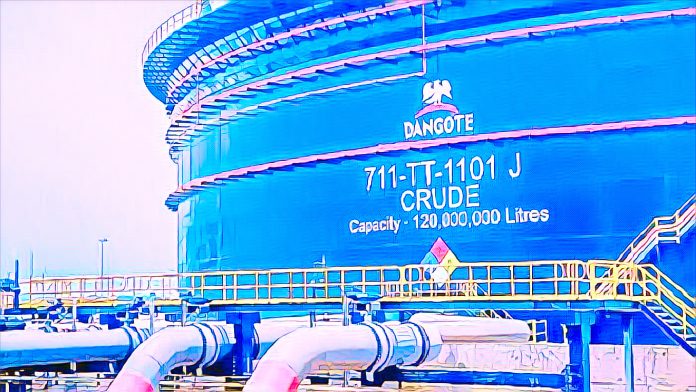KEY POINTS
- The Dangote oil refinery is expected to process 400,000 barrels of Nigerian crude oil daily, boosting local refining capacity.
- This move is part of Nigeria’s broader strategy to reduce its reliance on fuel imports and strengthen its energy security.
- The refinery’s operation is anticipated to significantly improve Nigeria’s foreign exchange reserves by reducing fuel import costs.
The Dangote oil refinery is to commence the processing of 400, 000 barrels of the Nigerian crude oil per day, a step that will help Nigeria reduce its importation of refined petroleum products.
This is one of the largest refineries in the world and its establishment will greatly transform the Nigeria oil sector by using Nigeria crude to meet the demand for refined products in the country.
This landmark changes the energy policy direction of Nigeria that for many years has been exporting crude oil but importing petroleum products.
The Dangote refinery, which has a production capacity of 650000 bpd, is expected to come on stream in the next few months, adding to Nigeria’s refining capacity.
Strengthening Nigeria’s energy security
Over the years, Nigeria has been in a fix as to why the country with the largest oil production in Africa imports most of its refined petroleum products despite having functional refineries.
This is something that the Dangote refinery in Lagos will help to overcome since its designed to process large quantities of Nigerian crude hence boosting energy security while still cutting down the importation of fuel products.
Business Day has reported that the ability of the refinery to process 400,000 barrels of the Nigerian crude daily will assist in the stabilization of the local market and also assist in the provision of fuel at a cheaper price.
This will remove the pressure on the foreign exchange reserve of Nigeria that has been highly eroded as a result of cost of importing refined products.
Economic advantages and foreign exchange conversions
The Dangote refinery is expected to make significant contribution to the enhancement of the Nigeria foreign exchange reserves.
When Nigeria is able to drastically reduce its fuel imports, the country will be able to save foreign exchange that would otherwise have been used to import refined products.
This is expected to curb the depreciation of the naira which is Nigeria’s own currency because the demand for the foreign currency in the import sector is quite high.
Besides, the establishment of the refinery is believed to generate employment opportunities and promote industrialization.
This way it is believed that with the new capacity in the refining, the country will begin to export refined petroleum products to other countries in Nigeria’s neighborhood positively impacting its foreign exchange window.
The Nigerian government believes that the success of the Dangote refinery will encourage more investment in refining and petrochemicals in Nigeria and support the country’s overall objective of economic diversification.
A new dawn for Nigeria’s oil industry
The commencement of the operation of the Dangote refinery is the dawn of a new phase in the Nigeria oil industry.
This way, Nigeria will be able to save foreign exchange, have better fuel prices and better foreign exchange reserves by processing a large percentage of its crude locally.
With the increasing production in the refinery, there exists a possibility of the country enjoying steady supplies of energy in the consumption area together with exportation to other nations in that region.
This development also brings to the fore the need for the government to continue to seek the partnership of the private sector in the quest to solve Nigeria’s age-long economic problems.



